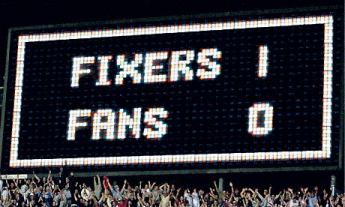The Baseball Metaphor
Consider the odds
Imagine there is a baseball game in which the winner gets to literally own the losers. The stakes would be immensely high. Then imagine that the home team had the following advantages:
- the game would be played on their home field
- the umpires would be employees of the home team
- the visiting team had to play without batting helmets, or any protective gear
- the strike and ball counts on batterers would be kept secret from them until after they were out
- the coaches for the visiting team would be employees of the home team
- the strikes zone was manipulated so that 100% of the home team’s pitcher’s pitches were strikes
- all replays were decided in favor the home team
- anyone protesting any umpire’s call would be immediately ejected and banned for life
- the visiting team was not allowed to call timeouts
- only home team fans were allowed to attend
- the home team, umpires and coaches were able to bet on the outcome and the payout on the bet came from the other team’s money
- the commissioner of baseball, the umpire’s union, the owners and players union sanctioned everything
The outcome of the game would be obvious even if the home team was totally incompetent; It would be a certain win for the home team.
But remember—the game decides if you are owned by another human being, so the visitors are forced to try. They run harder and faster; they swing for the fences; they play great defense; their pitchers expend maximum effort. Against incredible odds the game is close. Then with 2 outs in in the ninth inning trailing by only one run the visitors best batter comes to the plate. He is hit by a pitch but the umpire refuses to recognize it. He hits what appears to be a clearly fair ball home run down the left-field line that the umpire calls a foul ball. When the batter disputes the call, he is ejected from the game, fined the value of all his assets in the world and banned from baseball for life. The result of the game is literally a foregone conclusion.
The baseball metaphor is an accurate depiction of the nearly impossible odds of anyone attempting to prevent, terminate, or mitigate the abuse so often seen in guardianships across the country.
Baseball is our national pastime and even a hint that games are fixed or even influenced by outside influences, organized crime, bribed officials or dirty players is met with outrage, revulsion and demands for immediate reform. We must maintain the sanctity of the game. Corruption cannot be tolerated. That is why the position of baseball Commissioner is so indispensable in a game filled with incentives to cheat.
But in the judicial process governing guardianship, every phase of the game is predetermined, corrupt, illegal, and despicable. The position of commissioner is analogous to the position of the Chief Justice of the Supreme Court. He oversees the entire court process in his State Courts and if he fails to guarantee the authenticity and legitimacy of his courts, then everything that happens in those courts are as disgusting as a fixed baseball game.
As a sports fan, my interest in the game stems from the fact that it is an honest contest with the outcome to be determined legitimately. As a litigant in probate court I have learned that the contest is not legitimate, the fix is in, the deck is stacked, the calls always go to the home team, and that the outcome of the contest is predetermined before it even begins.
Judges, guardians, lawyers and the dozens of downstream stakeholders in this corrupt charade of protecting a vulnerable individual in predatory involuntary for profit guardianship will use any tactic, tell any lie, and indiscriminately abuse anyone who gets in their way or has the temerity to question any aspect of their pervasive abuse.
The stakes in a baseball game pale in comparison to the stakes in guardianship contests, but the outrage from the public about corruption and exploitation of the elderly seems too far away, too distant and too implausible until the racket starts playing against you.

